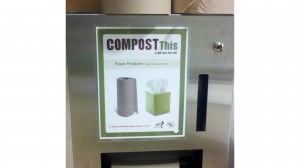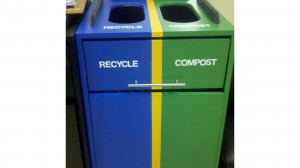 When Tundra discovered that a waste management snafu had resulted in office recycling bins getting thrown in the trash early this year, we decided a complete waste management audit was needed, and fast.
When Tundra discovered that a waste management snafu had resulted in office recycling bins getting thrown in the trash early this year, we decided a complete waste management audit was needed, and fast.
The lessons we’ve learned in the past three months have been both illuminating and hard won, and that’s why we’d like to share them with you now – so that your road to maximum waste management efficiency is a little easier.
Waste management efficiency – “Wow,” you’re thinking, “that sounds like a really fascinating thing I’d like to drop everything to learn more about.”
Well, as Tundra discovered, there really are some things going on here that could be costing your business money and customers, so if those two things are important to you then by all means read on and learn more about Tundra’s lurid tale of trials and waste tribulations.
The first challenge we faced was simply learning how our current waste management operated. Different people here at Tundra handled different parts of the system, and they were not always communicating effectively with each other.
Luckily, Tundra’s pricing analyst Jordan Scampoli was ready to take on the challenge of completely revamping how Tundra manages the waste it produces.
“Just by understanding the waste stream here at Tundra we were able to realize some pretty awesome efficiencies. Even though costs didn’t go down – in fact they rose, although not a lot – for us it was about the social multiplier: a little bit of effort and cost resulting in a lot of waste reduction.”
Right off the bat we discovered that although Tundra had arranged for trash pickup 5 days a week, the dumpster out back was almost never full. Cutting pickup down from 5 days to 2 days a week immediately translated into substantial savings, not to mention reduced emissions and fossil fuel usage from fewer garbage truck visits.
Easy win, sweet.
Recycling and composting, however, turned out to be a much harder nut to crack. It soon became apparent that introducing a compost and comprehensive recycling program that included hard-to-recycle materials like the shrink wrap used to package pallets of product in the warehouse would not be cost saving or even cost neutral, even in a recycling-friendly city like Boulder.
Even so, Tundra decided that social responsibility was more important than cost savings. We have a long history of giving back to our community that stems from one of the core values Tundra was founded upon – Share The Gains With Our People, Our Customers, and the Community.
So we forged ahead with a comprehensive recycling & composting program for the entire company, and as we did so more hurdles presented themselves.
The biggest obstacle lay with changing the daily habits of employees and educating everyone in the company about the difference between compostable and recyclable and which common trash items went where.

Our biggest success – at least from a waste reduction standpoint – came from transferring all the paper towel waste generated in the break room and in the bathrooms from straight-to-landfill to compost. It’s an easy switch that everyone can easily make.
There will always be room for improvement when it comes to changing the way Tundraites think about waste and recycling and changing habits. But the good news is that from just a couple improvement in the waste management system here at Tundra we were able to achieve measurable results – even if our costs went up a little bit.
And for most small-to-medium sized businesses, the tradeoffs with recycling and composting programs are going to be between ascribing to the values of social responsibility and community improvement and cost effectiveness.
Tundra’s waste management audit eliminated a lot of wasteful behaviors, redirected a lot of our waste into a more sustainable channel, and made the entire operation overall more sustainable and less, well, wasteful.
It took a combination of organizational support, a dedicated individual willing to put in the extra time to make it happen, and a strong set of community-based values to turn Tundra’s waste management system into something that can be legitimately called green.
Was it worth it? Yes, a hundred times over.
The reality is that small and medium sized businesses just don’t produce enough waste to realize significant cost savings, but that doesn’t mean those businesses shouldn’t have a sustainable waste management program.
It just means you have to value social responsibility and community participation over costs. And in truth it’s not like costs go up significantly. For a little extra cost a lot of sustainability can be achieved.
And, as Tundra discovered, just by simply reviewing how the current waste management system worked we were able to identify several problem areas that were easily fixed and resulted in significantly less waste.
That in itself is our reward.
What are the trials and tribulations you’ve faced with managing your restaurant or business’ waste? Share in the comments below!
 Corner Booth Blog | TundraFMP Restaurant Supply, News & Equipment Blog
Corner Booth Blog | TundraFMP Restaurant Supply, News & Equipment Blog





Really good thoughts. I think the big issue is how people view the process. If it becomes to difficult people are going to throw it in th trash. The better system businesses can put in the place the more likely it will be that they see sustained success with the program. Overall, I think businesses do need to realize that some small upfront costs are going to be worth it in the long run.
Matt
Hi Matt,
Thanks for your comments! I agree with you and I think as long as businesses factor in social responsibility when it comes to a recycling/composting element in their waste management system then the costs actually aren’t all that bad.
Kudos to Tundra for doing what they can to help.
Ann G.
ADS Solutions